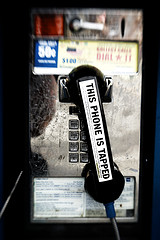
Justice Albin wrote for a unanimous Court in relevant part: The Court considers whether the right of privacy, safeguarded by the New Jersey Constitution, extends to an arrestee’s call on a police line from the stationhouse when neither party to the call is aware that the police are recording their conversation. Rasheem McQueen was arrested after driving off when Piscataway police officers attempted to stop him for traffic violations. At police headquarters, McQueen was permitted to make a call on a landline in the “report writing room.” No one told him the call would be recorded — as were all outgoing calls from headquarters. No sign was posted warning that all calls were recorded. No one stood over McQueen to listen to the conversation, and he “mumbled on the phone, hiding what his conversation was.”
Later that day, a detective recovered a gun found outside the home near where McQueen had been stopped and became “suspicious” about the call McQueen had made from headquarters. Without securing a warrant or a subpoena, or consent from McQueen, detectives listened to McQueen’s recorded conversation. The recording revealed that McQueen called Myshira Allen-Brewer and told her to look for his “blicky” — apparently a slang name for a handgun — near where the gun was found. McQueen was transferred to the Middlesex County Adult Correction Center (Correction Center), from where he made further telephone calls to Allen-Brewer on a clearly designated recorded line. During telephone calls placed from the Correction Center, an automated message advises the parties that their conversation is being recorded, and inmates receive written notification of the warning as well. In their conversations, McQueen again told Allen-Brewer to look for the “blicky.” A recording of those Correction Center conversations was secured through a grand jury subpoena.
This recitation of the case facts gives the impression that the police listened to the “report writing room” recording before the gun was recovered. The police likely would have lied about this during the suppression hearing. The lie would allow the prosecution to save the case from dismissal by arguing that the recovery of the gun was not derived from the unlawful recording and therefore should not be suppressed.